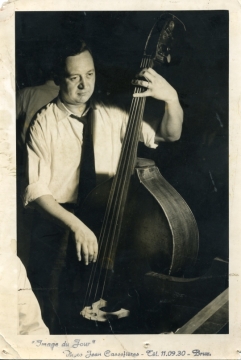These days the important role played by Belgians in the history of European jazz has been somewhat forgotten. Yet their contribution was far from negligible, as witnessed by the career of accordionist and double bass player Jean Vanden Heuvel (1926-2015), known as Jean Warland. As Belgium’s leading double bass jazz player in the 20th century, Jean Warland played in bands that marked the history of European jazz. For the greater part of his career he played in the West Deutsche Rundfunk jazz band in Cologne, playing alongside jazz greats such as Toots Thielemans, Ella Fitzgerald and Dizzy Gillespie. Yet, even as he became increasingly part of the international jazz scene, Warland continued to frequent Belgian clubs and concert halls, right up to the end of his musical activity and throughout his career, he passed on his passion for jazz to younger generations. Following the musician’s recent death, the Heritage Fund acquired Jean Warland’s studio collection and this will become part of the collections at the Musical Instruments Museum (MIM) in Brussels. The Warland Fund comprises Jean Warland’s musical instruments and accessories, an extensive international jazz record collection and numerous personal documents, including photographs and slides tracing his musical career. It is, however, the hundreds of recordings – mostly never released as records – made during concerts, jam sessions and studio rehearsals that are of particular historical interest. Among the recordings, some are especially worth mentioning: a tape labelled Django and various concert recordings of the Sax no End project. This exceptional collection is far more than a simple ensemble of souvenirs: it is a compendium that reflects the many facets of the career of one of Belgium’s most important jazz musicians. Jean Warland’s collection also makes a perfect match for the collection of the Robert Pernet Fund, which has also been entrusted to the MIM by the King Baudouin Foundation. Making these two collections available to the general public as well as researchers, the MIM is thus developing its profile as a reference centre for Belgian jazz. Further information about the Heritage Fund (in French)
